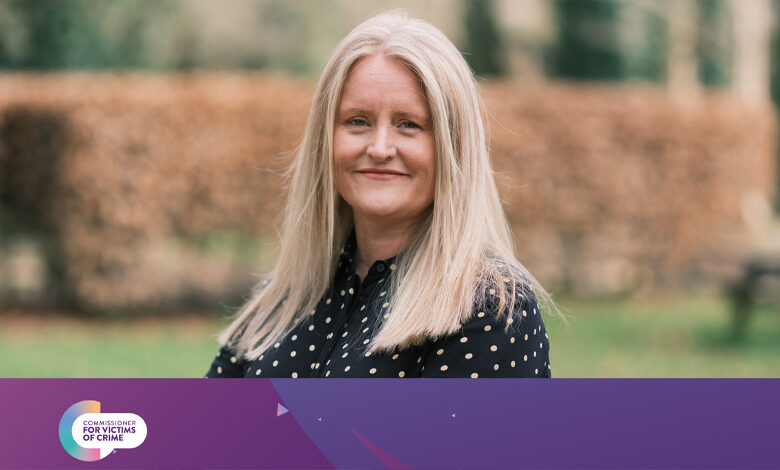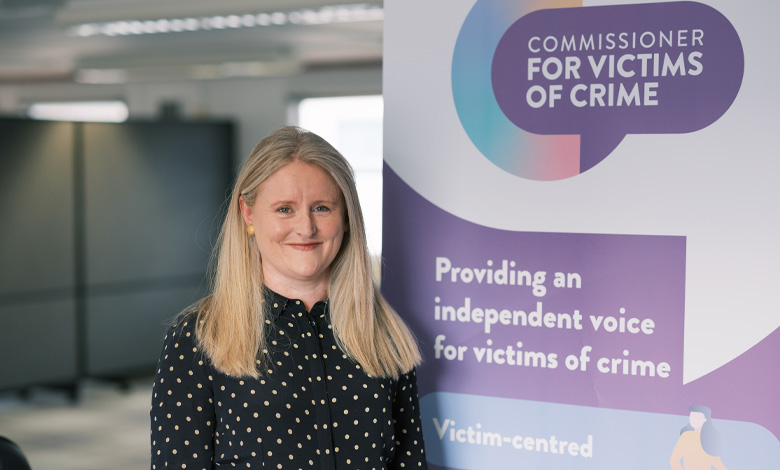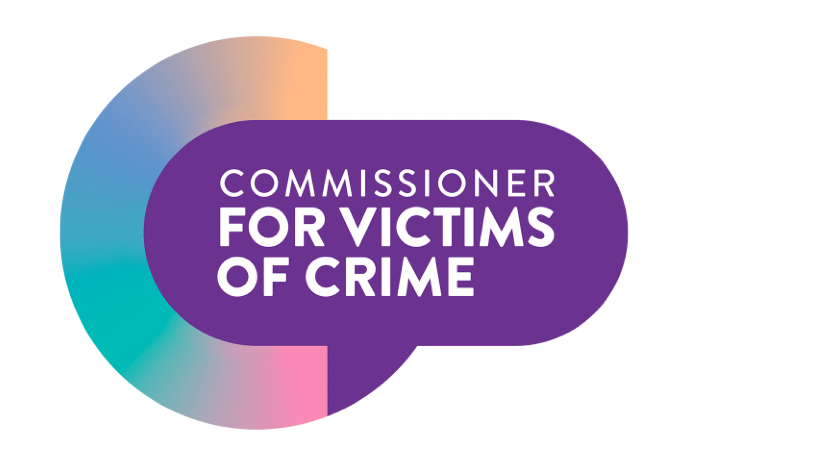A voice for victims

New Commissioner Designate for Victims of Crime for Northern Ireland, Geraldine Hanna, outlines her policy priorities in the areas of delay, data, and disclosure to improve victims’ experience of the criminal justice system.
Appointed in June 2022 by then Justice Minister Naomi Long MLA to be a senior, independent voice championing victims’ needs in the criminal justice system, Hanna acknowledges that her ambitions for the office as it nears the end of its first full year, have not been aided by the absence of government.
Hanna’s appointment was made with the clock ticking down on the previous Assembly mandate, meaning that no time remained to put the office on a statutory legislative footing. Meanwhile, the continued absence of an Executive has meant resourcing has been limited, and no future budget has been allocated.
However, despite the challenges, the Commissioner Designate says that work completed in the initial year of her three year term has built a solid foundation for progress – and she is hopeful that establishing her office in legislation will be a priority in any new mandate.
While Hanna’s post is new, her understanding of supporting the needs of victims is not. Over 21 years of working in victims’ services culminated in her taking up the post of Chief Executive of Victim Support NI in 2015, before accepting the Commissioner role.
“My purpose is to capture the experience of victims and use the collection of those experiences to identify themes and to champion change.”
“My background is victims’ services, I am passionate about the experiences of victims, so for me it seemed the natural next step,” she says, explaining her decision to take up the post.
The Commissioner role has been established to not only act as an advisor to government on the necessary legislative changes, but also as an advisor to the criminal justice sector around the experiences of victims and what steps they can take to improve that experience.
Setting out the rationale for her role, Hanna explains a collective feeling among victims of crime in Northern Ireland of being “bystanders” in the criminal justice process.
“Our adversarial system means that the State, not the victim, prosecutes the accused, and does so on behalf of the community. There is a recognised power imbalance there and to rectify that a lot of the law is weighted towards ensuring the defendant is given a fair trial and their rights are protected,” she says.
“Over the years, that focus on the role of the defendant and their rights has, in my opinion, overshadowed the rights and interests of the victim.”
While the Commissioner Designate recognises that protections for the accused are of major importance, she utilises the analogy of a three-legged stool, in which each leg represents the State, the accused and the victim, respectively. In her opinion, the leg of the victim is now shorter, causing an imbalance in the system.
“Victims are not a party to proceedings. Feedback tells us that in many cases victims feel they lose ownership of the case, as it becomes the prosecution’s case. The prosecution’s role is to represent the State. However, the interest of the victim and the interest of the State are not always the same.”
Quizzed on what should be done to improve victims’ experience of the system, Hanna says that legislation has a role, pointing to progress in the last Assembly mandate which saw the introduction of the Domestic Abuse and Civil Proceedings Act (Northern Ireland) 2021, the Protection from Stalking Act (Northern Ireland) 2022, and other policies.
However, Hanna believes that victims must feel valued and respected within our justice process, which she says stems from the treatment victims receive from the multiple criminal justice agencies.
Powers
It is envisaged that once written into legislation, the Commissioner for Victims of Crime will hold several powers, including:
- identifying, promoting, encouraging, and issuing guidance on good practice;
- reviewing the adequacy and effectiveness of law and practice;
- reviewing the operation and delivery of Charter entitlements and promotion of the Victim Charter;
- directing complaints and monitoring outcomes;
- advising and making recommendations; and
- undertaking or commissioning research.
Hanna says that she will advocate for the strongest possible powers for her office, explaining: “My purpose is to capture the experience of victims and use the collection of those experiences to identify themes and to champion change.
“Each criminal justice organisation has its own complaints process and my role does not overtake that. However, for victims it is often confusing as to where their complaint should be directed and so the Commissioner for Victims of Crime has a signposting role.
“In hearing those complaints, I will be able to build a picture of impact on victims, both negative and positive, and use that to feed back in to the criminal justice agencies on a day-to-day basis, while calling for policy change and potentially legislative change.”
In England and Wales, a Commissioner for Victims of Crime post was established over 20 years ago. Additionally, a Victims and Prisoners Bill was introduced in Westminster on 29 March 2023, aiming to strengthen the powers of the Victims Commissioner in England and Wales. Hanna believes that work in these two regions can help inform legislation here in Northern Ireland.

Delay
Established with a term of three years, with a possible one-year extension, Hanna has identified several policy priorities for her term, which she outlines as her three ‘Ds’ – delay, data and disclosure.
The first, she explains is around delay, and the impact delay has on the wellbeing and experience of the victim. Although a long-standing challenge for well over a decade, efforts to speed up justice had made little progress prior to the problem being further compounded by Covid-19.
Hanna believes that a “more systematic” approach is required, calling for criminal justice agencies to adopt a focus on delay from a victims’ perspective.
Somewhat ironically, a major criticism of the actions identified to address delay, is that they are not happening quickly enough, and are not being implemented fully.
“Resource is one of the challenges,” Hanna states, adding: “Post-Covid, the courts were all operating at 115 per cent capacity to address some of the backlog, and that was enabled through additional resources. However, this does not seem to be recognised in future funding plans.
“Equally, where good initiatives are developed, they need to be appropriately costed. The Domestic Abuse and Civil Proceedings Act was a fantastic step forward for victims, but it was not costed. What that means is that the system is equipped with no extra capacity for dealing with the reporting of, and processing of, a whole new crime.
“Since devolution, justice has been the poor relation in terms of sectoral funding. In my role, I will be striving to highlight that unless we invest in the justice system, victims will continue to experience these delays. My concern is that while we recognise the need to address delay, and the wider economic and societal costs these delays are having, we are not making effective decisions to drive change.”
Data
Another of Hanna’s policy priorities focuses on a lack of quality and accessible data in the criminal justice system, particularly around the needs and experiences of victims.
Pointing to the existence of over 10 separate case management systems in the criminal justice sector, Hanna says that it is currently impossible to track a victim from the moment they report to the disposal at court stage without a manual exercise.
The Commissioner Designate describes siloed data as “inefficient and ineffective” in monitoring strategic performance and is lobbying for the development of one case management system in the coming years.
“Currently, we are trying to tweak old systems to meet modern demand, but outcomes could be a lot better if we build a system with these needs in mind.”
“Such a system could reap a whole range of rewards, enabling real-time data to improve efficiency but also conveying information to the victims of crime. Currently, we are trying to tweak old systems to meet modern demand, but outcomes could be a lot better if we build a system with these needs in mind.”
On a more immediate level, Hanna is advocating for better performance monitoring from agencies in relation to the Victim Charter. Placed on a statutory footing in late 2015, the charter sets out the entitlements and services that victims of crime in Northern Ireland can expect to receive from a range of service providers.
However, in 2020, the Criminal Justice Inspectorate Northern Ireland identified that “substantial work” was needed to raise awareness within the sector about the Victim Charter, adding that criminal justice organisations tended to focus too much on statistics, meeting targets, and independence and put insufficient emphasis on personal experiences, which often had a lifelong impact on the victim, their families, and those closest to them.
“One of the biggest reasons for this lack of focus is that compliance is not monitored,” explains Hanna. “I am a firm believer that what gets monitored gets done and I want to work with justice agencies to develop a monitoring tool which in turn will allow for the benchmarking of progress and identify gaps.”
Disclosure
The Commissioner Designate’s other policy priority is around the disclosure of victims’ personal information. In May 2022, the UK’s Information Commissioner’s Office called for prosecutors and police to end the excessive collection of personal data from victims of rape and serious sexual assault. It followed a similar call in a review into law and procedures around serious sexual crime in Northern Ireland by John Gillen in 2019 for “a restructuring of the disclosure process”.
Hanna says that most of the challenge centres on current practice around disclosure not aligning with policy guidelines. The Commissioner Designate explains that she has been working with the Information Commissioner, the PSNI, and the PPS to tighten the safeguards around what personal information is being requested of a victim, and for what reason.
Directly related to this, is Hanna’s concern around the disclosure of victims’ counselling records. In February 2023, ahead of Sexual Violence Week, the Commissioner Designate issued a warning that victims of serious sexual assault are being forced to choose between healthcare and justice due to disclosure of counselling notes in criminal trials.
“I am deeply concerned that the disclosure of third-party counselling notes in rape and sexual assault trials is forcing victims to choose between accessing healthcare and accessing justice. The disclosure of excessive amounts of data and information, which can then be used in court by the defence, has the triple effect of retraumatising victims, making some victims reluctant to access crucial counselling services, or resulting in victims censoring their accounts of their experience to their counsellors in the knowledge that it may be used in court,” she says.
Hanna outlines that she is currently engaging with stakeholders to explore proposals to restrict or wholly exclude these counselling notes from criminal trials.
Experience
The Commissioner’s office was established with a special interest in domestic abuse, sexual abuse and hate crime. As a result, Hanna has established three related advisory panels comprising representatives of the voluntary sector and academics to help build evidence around thematic change. A fourth advisory panel also focuses on all crime.
Although established under the auspices of the justice ministry, and therefore focused on criminal justice, Hanna has advocated for the role of the Commissioner to be broadened beyond justice. Explaining this further, she says: “The needs of victims are broader than justice. The Victim Charter currently looks at criminal justice, but I think all government agencies should give consideration to how they respond to victims, be that in health, housing, or social services, for example.”
Assessing the volume of work for her and her office in the time ahead, Hanna concludes: “Victims of crime who come forward and share their experiences of the justice system do so with the sole aim of making the system better for those who come behind them.
“Unfortunately, for too many victims, their experience of the justice system is worse than their experience of the crime. I believe we have an onus as a sector and as a society to improve that system and to ensure that victims do come forward.”
In the year ahead, the Commissioner Designate has pledged to launch a victim survey, carried out on an annual basis to not only gather the experience of victims but also to benchmark performance and identify improvement gaps.
“We need to deliver a more tailored response to victims and part of the solution to doing so is through improved needs assessment. Combined with that we need increased advocacy support for individual victims.
“Achieving this will be a challenge but can also be a gamechanger in victims feeling heard, feeling valued and feeling like they are active participants in the justice system.”


W: www.cvocni.org
Twitter: @CVOCN





